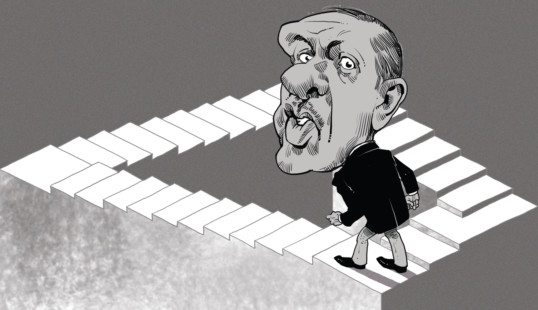
I visited the Turkish government’s website the other day and was surprised to see that the Foreign Ministry statement still boasts of its ‘Zero Problems with our Neighbours’ policy.
Last Wednesday, three-quarters of Turkey’s MPs backed a motion approving the deployment of Turkish troops in Syria and Iraq and allowing foreign troops to be stationed inside Turkey. It is likely that Turkish soldiers’ boots will be among the very first on the ground in the forthcoming battle against Daesh (Islamic State of Iraq and the Levant). This dangerous escalation of the crisis represents a complete U-turn by President Recep Tayyip Erdogan and will present his country with the most serious challenges of its modern history.
Turkey is the only Nato member in the Middle East and shares a long, porous border with Iraq and Syria. Nevertheless, in 2003, Erdogan refused to back the US-led invasion of Iraq and would not allow its airspace or the American air base at Incirlik in southern Turkey to be used to facilitate air strikes. Ankara was extremely reluctant to approve the no-fly zone over Libya and last month refused to sign a joint communique issued by ten Arab states in Jeddah stating a ‘shared commitment to stand united against the threat posed by all terrorism’.
So what has made Erdogan change his mind? In the past, he has shown himself to be a pragmatic leader in search of the best deal — a major reason for his recalcitrance over the intervention in Libya was that Turkey had construction contracts with the then leader, Muammar Gaddafi worth $30 billion (Dh110.34 billion); only when the US assured him that these contracts would still be honoured if Gaddafi was toppled did he agree. Now Libya is in total chaos and Erdogan has lost that gamble, at least for the time being.
Erdogan’s decision to cooperate with Washington and join the 40-odd other members of the ‘coalition of the willing’ came after a flurry of diplomacy that culminated in a telephone call from US President Barack Obama. The Turkish press leaked details of the plan agreed by the two men, which focuses as much on regime change in Damascus as it does on Daesh and it is the removal of his rival, Syrian President Bashar Al Assad, that Erdogan most urgently seeks.
There will be a no-fly zone on the Syrian side of the border. Since Daesh does not possess fighter planes, this is clearly designed to protect Turkey from air strikes by the Al Assad regime. In exchange for Turkish troops participating in ground and air attacks on Daesh-held areas, America has agreed to help re-organise and empower the Syrian opposition in order to form an alternative government; ‘moderate’ opposition brigades will be trained in new military units in Turkey, Saudi Arabia and Jordan to form the nucleus of a new Syrian army. The only problem with this plan is that the Syrian opposition remains as divided as ever and the rebel brigades are entirely dominated by radical Islamists. In addition, regime changes in Baghdad and Tripoli have ushered in nothing but chaos.
There are further paradoxes in this increasingly complicated situation. Having facilitated the passage of extremist fighters, weapons and funding via its porous border with Syria, Ankara is now preparing to attack many of those same brigades. In addition, Daesh’s battle with armed Kurdish militias could be construed as being of some benefit to Turkey which greatly fears its own restive Kurdish minority.
Erdogan’s attempt to play on all sides of the game is a highly risky strategy both domestically and in terms of Turkey’s international relations.
From 2003 onwards, Erdogan presided over Turkey’s ‘economic miracle’ which saw it become the 15th largest economic power in the world and greatly contributed to his own popularity at home. War is a costly business and the Turkish people are unlikely to applaud the sight of their sons returning in body bags. There were large demonstrations outside the parliament last Wednesday as MPs debated the decision to join the US-led coalition and Erdogan’s own power base will be weakened unless an immediate victory over both Daesh and Al Assad is simultaneously achieved. A highly unlikely outcome.
Turkey’s homeland security is also imperilled. Erdogan waited until 49 Turkish hostages held by Daesh had been safely released before bowing to US pressure to join the coalition. In effect, he deceived Daesh leader, Abu Bakar Al Baghdadi, who has vowed revenge. There are an estimated 1,000 Turks in Daesh. Any of them can be deployed to commit acts of terror at home, putting Turkey’s $35 billion tourism industry at risk.
Turkey’s mostly Sunni, 76 million population, also comprises Alawite and Shiite minorities. In addition, it is ethnically diverse with many minorities from Arabs to Kurds. The country’s own social cohesion may be jeopardised as Ankara enters this essentially sectarian fray. Recent events have seen Turkey increasingly isolated regionally. Erdogan’s Justice and Development Party is closely affiliated with the Muslim Brotherhood, which has become anathema to countries such as Egypt, UAE and Saudi Arabia since former Egyptian president Mohammad Mursi was deposed a year ago.
While he may have made new friends in Washington, London and Paris, Erdogan’s Turkey is facing turbulence at home.
Last Wednesday, Turkey went from ‘zero problems with neighbours’ to ‘nothing but problems with neighbours’. I wonder if the Foreign Ministry will change its website accordingly!
Abdel Bari Atwan is the editor-in-chief of digital newspaper Rai alYoum: http://www.raialyoum.com. You can follow him on Twitter at www.twitter.com/@abdelbariatwan.











